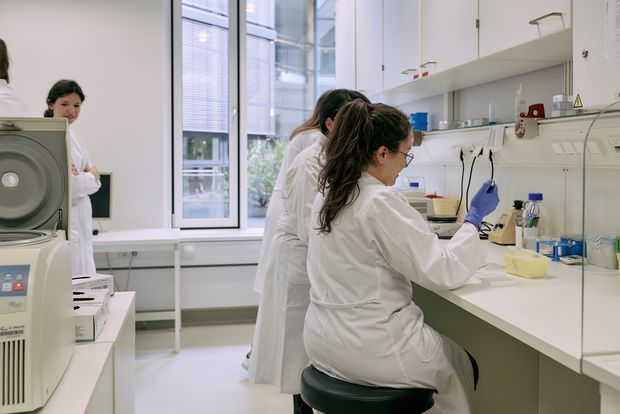
Technische Assistentin / Technischen Assistenten (w/m/d)
Wir suchen für das Forschungsinstitut für Augenheilkunde zum nächstmöglichen Zeitpunkt eine / einen
Technische Assistentin / Technischen Assistenten (w/m/d)
für das Molecular Biology of Retinal Degenerations, Ueffing Lab in Teilzeit (50%) ab 1. Februar 2026 und befristet bis zum 31. Dezember 2030.
JETZT BEWERBEN
Das Forschungsinstitut für Augenheilkunde ist in das integrierte Forschungs- und Behandlungszentrum für Augenheilkunde am Universitätsklinikum Tübingen eingebettet. Es bietet hervorragende Infrastrukturen sowie ein lebendiges Umfeld für grundlagen- und klinische Forschung. Das Forschungsinstitut wird von Prof. Dr. rer. nat. Marius Ueffing geleitet und arbeitet eng mit der Universitäts-Augenklinik unter der Leitung von Prof. Dr. med. Karl Ulrich Bartz-Schmidt zusammen. Ziel des Instituts ist, die Ursachen für degenerative, entzündliche, neoplastische und vaskuläre Erkrankungen des Auges zu erforschen und darauf basierend Diagnostik und Therapien zu entwickeln.
Ihre Aufgaben:
- Arbeiten mit Zellkulturen
- Arbeiten an Netzhaut-Organkulturen
- Anfertigen von Gewebeschnitten und Färbungen (z. B. HE, IHC)
- Durchführung von molekularbiologischen und biochemischen Experimenten
- Dokumentation der Ergebnisse und Mithilfe bei Auswertungen
- Allgemeine Labororganisation
Ihr Profil:
- Abgeschlossene Ausbildung als MTA/BTA oder eine vergleichbare Ausbildung oder ein Hochschulabschluss im Life Science-Bereich
- Erfahrung in zellkultur-, immunohistologischen und zellbiologischen Verfahren
- Sicherer Umgang mit gängigen Betriebssystemen und MS-Office-Anwendungen
- Bereitschaft zum Erlernen neuer Techniken und Methoden sowie Zuverlässigkeit
- Ein hohes Maß an Kommunikations- und Teamfähigkeit
- Selbstständiges, strukturiertes und verantwortungsbewusstes Arbeiten
- Gute Englischkenntnisse
Ihre Vorteile bei uns:
- Mitarbeit im vielseitigen Umfeld eines modernen Universitätsklinikums, welches neben der Krankenversorgung zusätzlich die medizinische Forschung und Lehre fokussiert
- Zukunftssicherer Arbeitsplatz und Standort sowie eine attraktive Vergütung einschließlich betrieblicher Altersversorgung (VBL) bei gleichzeitig möglichst flexiblen Arbeitszeitregelungen
- Zuschuss zum Ticket für den öffentlichen Nahverkehr und attraktive Nachlässe auf unseren Angebotsplattformen für Mitarbeitende
- Strukturierte Onboarding-Phase, klinikumseigene Akademie zum Ausbau der Fach-, Sozial- und Methodenkompetenz
- Gesundheitsvorsorge durch vielfältige Sportangebote
Wir wenden den Tarifvertrag der Universitätsklinika Baden-Württemberg (TV-UK) an, Schwerbehinderte werden bei gleicher Eignung vorrangig berücksichtigt. Vorstellungskosten können leider nicht übernommen werden. Wir bitten um Beachtung der geltenden Impfregelungen.
JETZT BEWERBEN



